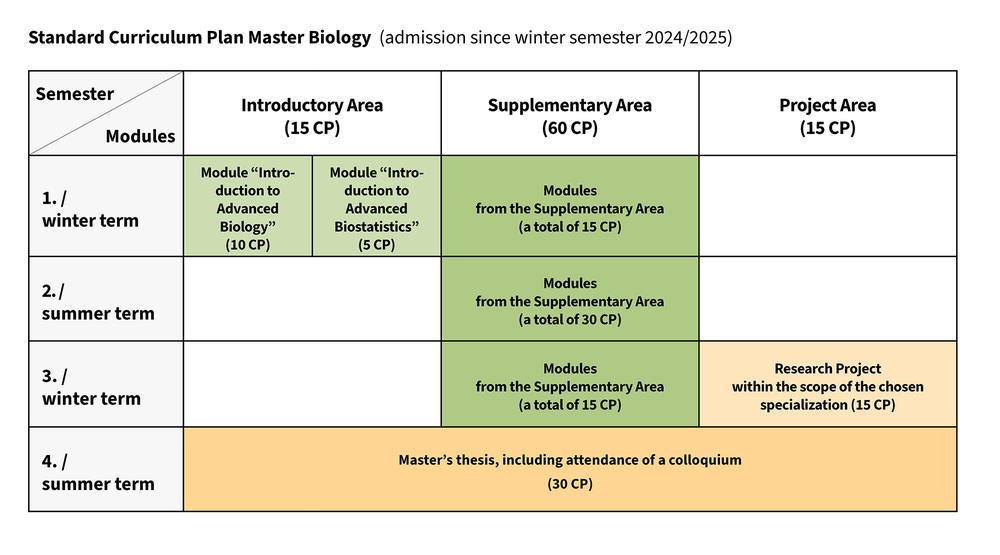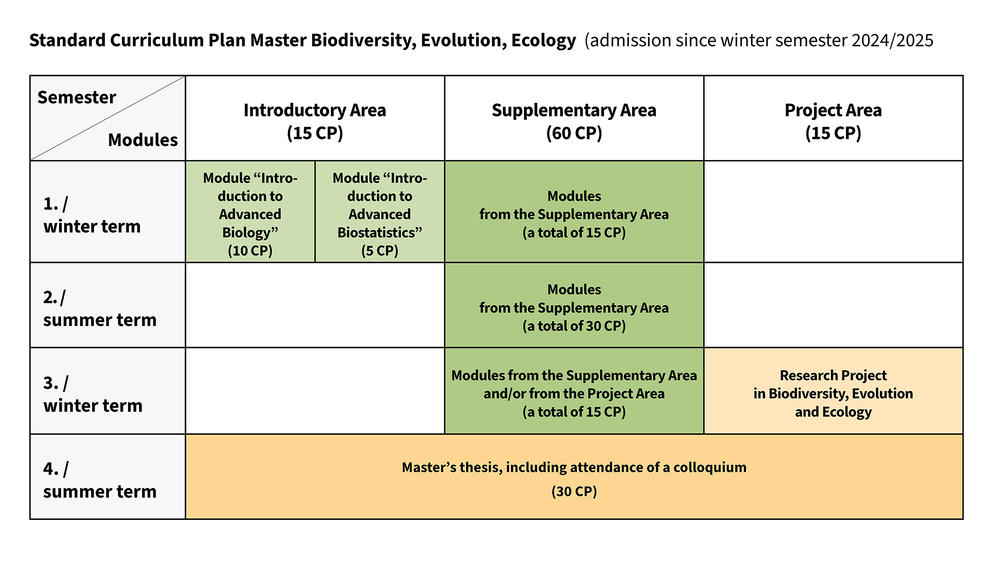Department of Biology, Chemistry, Pharmacy
Service Navigation
Overview: Master’s Degree Programs in Biology
- Degree sought: Master of Science (M.Sc.)
- Extension of theoretical and practical basics of biology; deepening of methods and techniques of modern biological research, specialization to the extent of 60 credit points possible
- Standard time to degree: 4 semesters
- Language: English, additional language skills: German A1
- Program start: 1 October (admission is open from mid-April to the end of May)
Earlier versions of these Master’s Programs
Contents of the Master’s Degree Programs
The two degree programs MSc Biology and MSc Biodiversity, Evolution, and Ecology have the same structure: A total of 120 credit points must be earned. The majority of these credit points can be obtained through a wide variety of courses in the supplementary area.
Towards the end of the studies, there needs to be a second mandatory module completed called the “Research Project” (15 credit points). It can be carried out in any of the research groups at the institute or in various external research facilities. This module can be undertaken in the same group or laboratory where the Master’s thesis will be conducted, but it can also be separate from the thesis. However, if you study in the Master’s Degree program “Biodiversity, Evolution, Ecology”, you have to choose a research project with this specialisation.
Current module description:
>> Modules of the Masters's Program Biology (incomplete translation)
However, the modules of the previous study examination regulations can give you a first overview:
>> Modules of the Master’s Program Biology (in German)
>> Modules of the Master’s Programm Biodiversity, Evolution, Ecology (in German)
The standard curriculum plan is of particular significance in Biology. Each module in Biology offers a limited number of places for its courses, which are allocated every semester according to a specific procedure. According to legal regulations, the Office of Academic Affairs must assign these courses on the basis of the standard curriculum. Those who deviate from the standard curriculum plan may encounter issues, such as difficulties in securing places for lab courses.
Students who are unable to adhere to the standard curriculum plan are encouraged to seek guidance from the counseling service at the Office of Academic Affairs at their earliest convenience.
Specializations and modules to choose:
If you are enrolled in the Master’s program “Biodiversity, Evolution, Ecology,” you will graduate with that exact degree title.
However, if you are studying in the Master’s program “Biology,” you have the option to choose a specialization based on your interests. Upon successful completion of the program, your certificate will indicate that you hold a Master’s degree (MSc) in Biology with a specialization in one of the following areas:
- Biodiversity, Evolution, and Ecology (yes, this can also be a specialization of the MSc Biology)
- Genetics and Genomics
- Microbiology
- Molecular and Cellular Biology
- Molecular Plant Sciences
- Neurobiology and Behaviour
- Biology
How to attain one of the specializations?
You need to select supplementary modules that are relevant to your desired specialization, totaling at least 15 credits (which is quite manageable). Additionally, your Research Project (15 credit points, third semester) must be carried out within the scope of your chosen specialization. The same requirement applies to your thesis as well.

